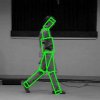Free Online Productivity Tools
i2Speak
i2Symbol
i2OCR
iTex2Img
iWeb2Print
iWeb2Shot
i2Type
iPdf2Split
iPdf2Merge
i2Bopomofo
i2Arabic
i2Style
i2Image
i2PDF
iLatex2Rtf
Sci2ools
109
click to vote
ICCV
1999
IEEE
1999
IEEE
Dynamic Feature Ordering for Efficient Registration
Existing sequential feature-based registration algorithms involving search typically either select features randomly (eg. the RANSAC[8] approach) or assume a predefined, intuitive ordering for the features (eg. based on size or resolution). This paper presents a formal framework for computing an ordering for features which maximizes search efficiency. Features are ranked according to matching ambiguity measure, and an algorithm is proposed which couples the feature selection with the parameter estimation, resulting in a dynamic feature ordering. The analysis is extended to template features where the matching is non-discrete and a sample-refinement process is proposed. The framework is demonstrated effectively on the localization of a person in an image, using a kinematic model with template features. Different priors are used on the model parameters and the results demonstrate nontrivial variations in the optimal feature hierarchy.
Algorithms Involving Search | Computer Vision | ICCV 1999 | Intuitive Ordering | Optimal Feature Hierarchy | Sequential Feature-based Registration | Template Features |
Related Content
| Added | 15 Oct 2009 |
| Updated | 31 Oct 2009 |
| Type | Conference |
| Year | 1999 |
| Where | ICCV |
| Authors | Tat-Jen Cham, James M. Rehg |
Comments (0)

